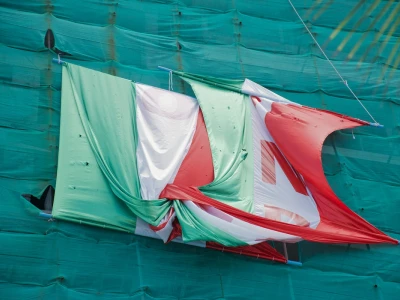
HC against disclosure of police identity in India Out banner removal
President Ibrahim Mohamed Solih's decree instructed the police to stop such banners from being displayed in the public.
By
Fathmath Ahmed Shareef
High Court on Tuesday set aside the Information Commissioner's directive to disclose the identity of the police who had taken out a banner that was put up at the residence of opposition leader and former president Abdulla Yameen Abdul Gayoom as part of the oppositiojn's India Out campaign.
India Out campaign saw banners in several parts of the city, including Dhoovehi and the party office.
The banners were taken by the police after obtaining a court order. The reason for removing the banners was stated as:
-
Putting up banners with India Out as seen in public is an act directed at a particular country
-
Because it is an act of violence that will adversely affect diplomatic and cultural relations between the Maldives and its neighbours and the interests of the Maldives and Maldivians
-
As an institution entrusted with the power and responsibility to take immediate action to create an environment protected from domestic threats and to safeguard the public interest under the Police Services Act
Ahmed Azan Marzoog of Dhiyaresnewspaper sought details of how the police were deployed in April last year to remove the banner in Dhoovehi.
Here's the information he sought:
-
How the police reacted to the President's Office's resolution to stop 'India Out' movement
-
In addition to the resolution, a copy of the written instructions from the President's Office to stop the movement
-
In April last year, when the court ordered the police to enter a house in Male to remove the India Out banners, the identity of the senior police officer who ordered them to do so, and if it was in writing, a copy of the letter that was issued.
-
Name, service number and rank of all police personnel involved in the raid to enter the house to remove banners
-
The role played by individual police personnel in the operation, and if any footage was taken from the body cameras
-
Name and rank of the police commander who led the operation
Of these information, the police disclosed the information mentioned in the first two questions. Apart from this, the police informed Azan that the information cannot be disclosed as the demands include sensitive information of individual police personnel.
-
Not satisfied with this, Azan had approached the Information Commissioner's office on July 20 last year seeking the information
-
In this case, the Information Commissioner had on August 31 concluded that it was information that could be disclosed
-
Asked to furnish the information within three official days
The High Court's decision on Tuesday came for a plea filed by the police in October, not satisfied with the Information Commissioner's decision.
The police have sought quashing of this part of the decision by the Information Commissioner who interpreted the Right to Information (RTI) Act and held that certain sections of the Act were violative of the rules of law and the principles of interpretation.
The High Court said:
-
Information Commissioner's decision was wrong
-
Information Commissioner's direction to release information such as name and rank of the police commander who carried out the operation and individual police officers in the operation does not appear to be in consonance with the law
-
Whatever the interest of the owner of the house to get the name of an officer entering the house, the public interest lies in not disclosing information that threatens the lives of individual policemen in public
President Ibrahim Mohamed Solih's decree instructed the police to stop such banners from being displayed in the public.
Yameen had filed a case in the High Court against the police entering the house after obtaining an order from the Criminal Court and removing banners.
In May last year, the High Court had held:
-
The trial court had issued an order to remove the banner in Dhoovehi in a wrong manner
-
The order does not provide sufficient reason for passing the order or the reason for the judgment




